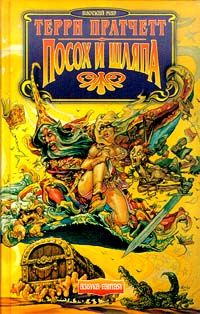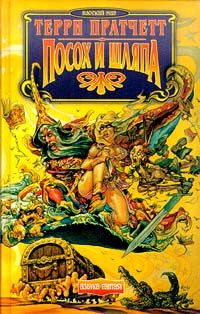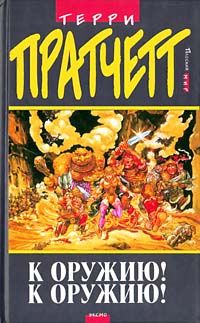Terry Pratchett - I Shall Wear Midnight
‘It’s a matter of opinion,’ said Tiffany.
Oh, now I see you. I see you, you filth, you plague, you noxious abomination!
Tiffany looked at Letitia’s mirror, which was big and had around it lots of fat, golden cherubs who were clearly catching their death of cold. There was Letitia’s reflection, and there was – faint but visible – the eyeless face of the Cunning Man. The outline of the Cunning Man began to thicken. Tiffany knew that nothing in her face had changed. She knew it. I won’t answer him, she thought. I had almost forgotten all about him. Don’t answer. Don’t let him get a hold on you!
She managed to smile while Letitia hauled out from cases and chests what she called her trousseau which, in Tiffany’s opinion, contained the world’s entire supply of frilliness. She tried to focus on it, to let frilliness fill her mind and somehow chase away the words that came pouring from him. The ones she understood were bad enough; the ones that she didn’t were worse. Despite everything, the creaking, choking voice got through again: You think you have been lucky, witch. You hope you will be lucky again. You need to sleep. I never sleep. You have to be lucky time after time. I have to be lucky just once. Just once, and you will … burn. That last word was soft, almost gentle, after the creaking, coughing, scraping words that came before. It sounded worse.
‘You know,’ said Letitia, looking thoughtfully at a garment that Tiffany knew she could never afford. ‘While I am truly looking forward to being the mistress of this castle, I must say that the drainage system here smells dreadful. In fact, it smells like it has never been cleaned since the world began. Honestly, I could believe that prehistoric monsters have done their business in it.’
So she can smell him, Tiffany thought. She is a witch. A witch who needs training because without it she’s going to be a menace to everybody, not least herself. Letitia was still prattling on – there was no other word for it. Tiffany, still trying to defeat the voice of the Cunning Man by sheer will, said aloud, ‘Why?’
‘Oh, because I think the bows look a lot more fetching than buttons,’ said Letitia, who was holding up a nightdress of considerable splendour, another reminder to Tiffany that witches never really had any money.
You burned before and so did I! croaked the voice in her head, but this time you will not take me! I will take you and your confederacy of evil!!!!!
Tiffany thought she could actually see the exclamation marks. They shouted for him, even when he spoke softly. They jumped and slashed at his words. She could see his contorted face and the little flecks of foam that accompanied the finger-waving and shouting – gobs of liquid madness flying through the air behind the mirror.
How lucky for Letitia that she couldn’t hear him yet, but her mind was currently full of frills, bells, rice and the prospect of being at the centre of a wedding. Not even the Cunning Man could burn his way through that.
She managed to say, ‘It’s not going to work for you.’ And part of her kept repeating, inside her head: No eyes. No eyes at all. Two tunnels in his head.
‘Yes, I think you’re right. Possibly the mauve one would look better,’ said Letitia, ‘although I have always been told that eau-de-nil is really my colour. By the way, could I make things up to you in some way by having you as my chief bridesmaid? Of course, I’ve already got a load of tiny distant cousins who I understand have been wearing their bridesmaids’ dresses for the past two weeks.’
Tiffany was still staring at nothing, or rather, at two holes into nothing. At the moment, they were the most important things in her mind, and they were quite bad enough without adding tiny little cousins into the mixture. ‘I don’t think that witches are bridesmaid material, thank you all the same,’ she said.
Bridesmaids? A wedding?
Tiffany’s heart sank further. There was no help for it. She ran out of the room before the creature could learn anything more. How did it search? What was it looking for? Had they just given it a clue? She fled down to the dungeon, which was right now a place of refuge.
There was the book that Letitia had given to her. She opened it and began to read. She had learned to read fast up in the mountains, when the only books you could get were from the travelling library, and if you were late returning them they charged you an extra penny, an appreciable amount when your standard unit of currency is an old boot.
The book told stories of windows. Not ordinary windows, although some might be. And behind them … things – monsters, sometimes. A painting, a page in a book – even a puddle in the right place – could be a window. She remembered once more the nasty goblin in the old book of fairytales; sometimes it was laughing and at other times it was grinning. She had always been sure about that. It wasn’t a big change, but it was still a change. And you always wondered: What was it like that last time? Did I remember it wrong?
The book rustled under Tiffany’s hands like a hungry squirrel waking up in a hollow tree full of nuts. The author was a wizard, and a long-winded one at that, but the book was fascinating even so. There had been people who walked into a picture, and people who had walked out of one. Windows were a way of getting from one world into another, and anything could be a window and anything could be a world. She had heard that the sign of a good painting was that the eyes followed you around the room, but according to the book it was quite likely that they might follow you home and upstairs to bed, as well – an idea that she would rather not think about right now. Being a wizard, the author had tried to explain it all with graphs and charts, none of which helped in any way.
The Cunning Man had run towards her inside a book, and she had slammed it shut before he got out. She had seen his fingers just as the press had spun down. But he couldn’t have been squashed inside the book, she thought, because he wasn’t really in the book at all, except in some magical way, and he’s been finding me in other ways too. How? Right now, those tiresome days of seeing to broken legs, bad stomachs and ingrown toenails suddenly seemed quite attractive. She’d always told people that was what witchcraft was all about, and that was true, right up until the time something horrible could jump out of nowhere. That was when a poultice just wouldn’t do the trick.
A piece of straw floated down and landed on the book. ‘It’s safe for you to come out,’ said Tiffany. ‘You are here, aren’t you?’
And right by her ear a voice said, ‘Oh aye, that we are.’ They appeared from behind straw bales, spider webs, apple shelves, goats and one another.
‘Aren’t you Wee Mad Arthur?’
‘Aye, miss, that is correct. I have to tell ye, to my embarrassment, that Rob Anybody is placing a big trust in me because I am a polisman and Rob appeared to think, ye ken, that if ye are dealing with bigjobs, a polisman will make them even more afeared. Besides, I can speak bigjob! Rob is spending more time up at the mound right now, ye ken. An’ he doesnae trust yon Baron not tae come up there with shovels.’
‘I will see that does not happen,’ said Tiffany firmly. ‘There has been a misunderstanding.’
Wee Mad Arthur did not look convinced. ‘It is glad I am to hear you say that, miss, and so will the Big Man be, because I can tell ye that when the first shovel breaks into the mound there willnae be a living man left in yonder castle, and great will be the lamentation of the women, present company excepted.’ There was a general murmuring from the other Feegles, on the broad theme of slaughter for whoever laid a hand on a Feegle mound, and how personally each and every one of them would regret what he would have to do.
‘It’s yon troosers,’ said Slightly-Thinner-Than-Fat-Jock-Jock. ‘Once a man gets a Feegle up his troosers, his time of trial and tribulation is only just beginning.’
‘Oh aye, it will be a great time o’ jumpin’ and leapin’ up and doon for such as them,’ said Wee Jock o’ the White Head.
Tiffany was shocked. ‘When was the last time Feegles fought with bigjobs, then?’
After some discussion among the Feegles, this was declared to be the Battle o’ the Middens when, according to Wee Jock o’ the White Head, ‘There was never such a screaming and rushing about and stamping on the ground, and pitiable sobbing, the like of which was never before heard, along with the coarse tittering of the ladies as the men scrambled to divest themselves of troosers that were suddenly no longer their friends, if ye ken what I’m saying.’
Tiffany, who had been listening to the tale with an open mouth, had the presence of mind to shut it, and then open it again to say, ‘But have Feegles ever killed a human?’
This led to a certain amount of deliberate lack of eye contact among the Feegles, plus quite a lot of foot shuffling and head scratching, with the usual fallout of insects, hoarded food, interesting stones and other unspeakable items. In the end, Wee Mad Arthur said, ‘Being as I am, miss, a Feegle who has only but recently learned that he is not a fairy cobbler, I ha’ nae pride tae lose by telling ye that it is true that I have been speaking to my new brothers and learned that, when they lived up in the far mountains, they did have tae fight humans sometimes, when they came a-digging for the fairy gold, and a terror-err-able fighting did take place and, indeed, those bandits as were too stupid to run may have found themselves clever enough to die.’ He coughed. ‘However, in defence of my new brethren I must point out that they always made certain that the odds were fair and just, which is to say one Feegle to every ten men. Ye cannae say fairer than that. And it wasnae their fault that some men just wanted tae commit suicide.’
There was a glint in Wee Mad Arthur’s eye that prompted Tiffany to ask, ‘How exactly did they commit suicide?’
The policeman Feegle shrugged his small broad shoulders. ‘They took a shovel to a Feegle mound, miss. I am a man who knows the law, miss. I never saw a mound until I met these fine gentlemen, but even so my blood boils, miss, it boils, so it does. My heart it does thump, my pulse it does race, and my gorge it arises like the breath of some dragon at the very thought of a bright steel shovel slicing through the clay of a Feegle mound, cutting and crushing. I would kill the man that does this, miss. I would kill him dead, and chase him through the next life to kill him another time, and I would do it again and again, because it would be the sin o’ sins, to kill an entire people, and one death wouldnae be enough for recompense. However, as I am an aforesaid man of the law, I very much hope that the current misunderstanding can be resolved withoot the need for wholesale carnage and bloodletting and screaming and wailing and weeping and people having bits of themselves nailed to trees, such as has never been seen before, ye ken?’ Wee Mad Arthur, holding his full-sized policeman’s badge like a shield, stared at Tiffany with a mixture of shock and defiance.
And Tiffany was a witch. ‘I must tell you something, Wee Mad Arthur,’ she said, ‘and you must understand what I say. You have come home, Wee Mad Arthur.’
The shield dropped out of his hand. ‘Aye, miss, I ken that now. A policeman should not say the words I just said. He should talk about judges and juries and prisons and sentences, and he would say ye cannae take the law intae your own hands. So I will hand in my badge, indeed, and stay here among my own folk, although I have to say, with better standards o’ hygiene.’
This got a round of applause from the assembled Feegles, although Tiffany wasn’t sure that most of them fully understood the concept of hygiene or, for that matter, obeying the law.
‘You have my word,’ said Tiffany, ‘that the mound will not be touched again. I will see to it, do you understand?’
‘Och, weel,’ said Wee Mad Arthur tearfully. ‘That might be all very well, miss, but what will happen behind your back when ye are a-flying and a-whizzing aboot your verrae important business across the hills? What will happen then?’
All eyes turned to Tiffany, including those of the goats. She didn’t do this kind of thing any more because she knew it was bad manners, but Tiffany picked up Wee Mad Arthur bodily and held him at eye level. ‘I am the hag o’ the hills,’ she said. ‘And I will vow to you and all other Feegles that the home of the Feegles will never be threatened with iron again. It will never be behind my back but will always be in front of my eyes. And while this is so, no living man will touch it if he wants to remain a living man. And if I fail the Feegles in this, may I be dragged through the seven hells on a broomstick made of nails.’
Strictly speaking, Tiffany admitted to herself, these were pretty much empty threats, but the Feegles did not think an oath was an oath if it didn’t have lots of thunder and lightning and boasting and blood in it. Blood, somehow, made it official. I will see to it that the mound is never touched again, she thought. There is no way that Roland can refuse me now. And besides, I have a secret weapon: I have the trust and confidence of a young lady who is soon going to be his wife. No man can be safe in those circumstances.
In the glow of reassurance Wee Mad Arthur said happily, ‘Well spoken, mistress, and may I take the opportunity on behalf of my new friends and relatives tae thank ye for explaining all aboot the business of the wedding nuptials the noo. It was verrae interesting to those of us who have little to do with such things. Some of us was wondering if we could ask questions?’
Being threatened by a spectral horror was terrible enough right now, but somehow the thought of the Nac Mac Feegle asking questions about the facts of married life among humans was even worse. There was no point in explaining why she wasn’t going to explain; Tiffany simply said ‘No’ in a tone of voice like steel and very carefully put him back down on the ground. She added, ‘You shouldn’t have been listening.’
‘Why not?’ said Daft Wullie.
‘You just shouldn’t! I’m not going to explain. You just shouldn’t. And now, gentlemen, I’d like a bit of time to myself, if it’s all the same to you.’
Some of them would follow her, of course, she thought. They always did. She went back up to the hall and sat down as close as possible to the huge fire. Even in late summer, the hall was cold. It was hung with tapestries as insulation from the chill of the stone walls. They were the usual sort of thing: men in armour waving swords and bows and axes at other men in armour. Given that battle is very fast and noisy, they presumably had to stop fighting every couple of minutes to give the ladies who were making the tapestry a little time to catch up. Tiffany knew the one nearest the fire by heart. All the kids did. You learned your history off the tapestries, if there was some old man around to explain what was going on. But generally, when she was a lot younger, it had been more fun to make up stories about the different knights, like the one who was desperately running to catch up with his horse, and the one who had been thrown by his horse, and, because he had a helmet with a point on it, was now upright head first in the ground, which, even as children, they had recognized was not a good position to be in on the battle-field. They were like old friends, frozen in a war whose name nobody on the Chalk could remember.



